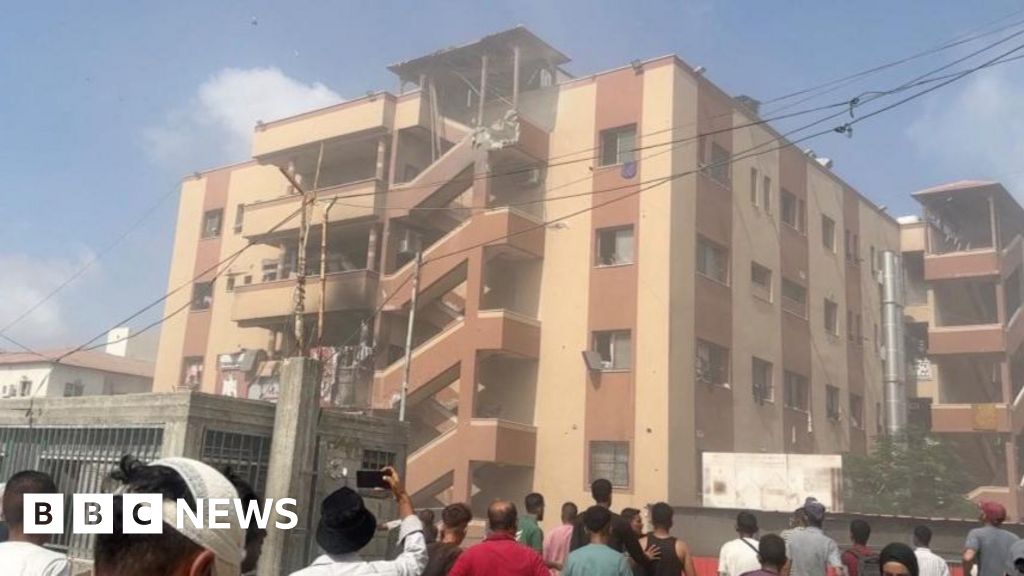The UN has said there needs to be justice following Israel's double strike on a Gaza hospital which killed at least 20 people, as an initial Israeli military probe said the strike had targeted a camera positioned by Hamas.
Condemnation of the attack, whose victims included five journalists and four health workers, has been mounting, with UK Prime Minister Keir Starmer describing it as completely indefensible.
Later on Tuesday the Israel Defense Forces (IDF) released its initial inquiry, which identified several gaps for further investigation.
It came as Israelis launched a day of nationwide protests calling on their government to accept a deal to release the hostages.
Monday's attack on Nasser hospital in Khan Younis saw an initial strike kill at least one person, a Reuters cameraman who was operating a live TV feed from a staircase on the side of the hospital building. A second strike in the same location about 10 minutes later hit journalists and rescuers who were attending the scene.
At least 20 people were killed including four health workers and five journalists who worked for international media outlets, including the Associated Press, Reuters, Al Jazeera and Middle East Eye.
This is a shock and this unacceptable, UN human rights office spokesperson Thameen al-Kheetan said on Tuesday. This raises many, many questions about the targeting of journalists and all of these incidents must absolutely be investigated and those responsible must be held accountable.
Speaking about past Israeli investigations into deaths in Gaza, he added: These investigations need to yield results. There needs to be justice. We haven't seen results or accountability measures yet.
In its statement, the IDF said it identified a camera positioned by Hamas in the area of the hospital used to observe the activity of IDF troops, without providing evidence. The troops operated to remove the threat by striking and dismantling the camera, the statement said. It alleged that six of those killed were terrorists. A military spokesperson later said that journalists working for Reuters and the Associated Press had not been a target.
The IDF report appears to be a shift in tone from Prime Minister Netanyahu's statement on Monday evening, which characterised the incident as a tragic mishap.
However the IDF did not explain why a second attack was launched minutes after the first. It instead said further investigation was needed into the authorisation process, including the ammunition used and the military's decision-making process in the field.
Israel has repeatedly targeted hospitals in Gaza throughout the war, despite the protections they receive in international law, saying that the medical facilities are being used by Hamas.
In Israel, protesters blocked highways with burning tyres and held demonstrations in Tel Aviv and other cities to demand their government agree a ceasefire deal to return the remaining hostages held by Hamas, and end the war.
The Israeli government has so far dismissed a ceasefire proposal agreed to by Hamas, despite its having previously signing up to it. Netanyahu says the government now wants a different deal that would see all hostages released in one exchange.
In Jerusalem, hundreds of demonstrators gathered outside the prime minister's office where a security cabinet meeting was taking place. Qatar, one of the parties involved in ceasefire talks - said mediators were still waiting for an answer from Israel to the latest proposal.
US envoy Steve Witkoff meanwhile said President Donald Trump would chair a meeting on a post-war plan for Gaza at the White House on Wednesday.
Israel believes that only 20 of the 50 hostages held by Hamas in Gaza are still alive after 22 months of war.
At least 62,819 people have been killed in Gaza since then, according to the territory's health ministry.
Most of Gaza's population has also been displaced multiple times; more than 90% of homes are estimated to be damaged or destroyed; and the healthcare, water, sanitation and hygiene systems have collapsed.


















